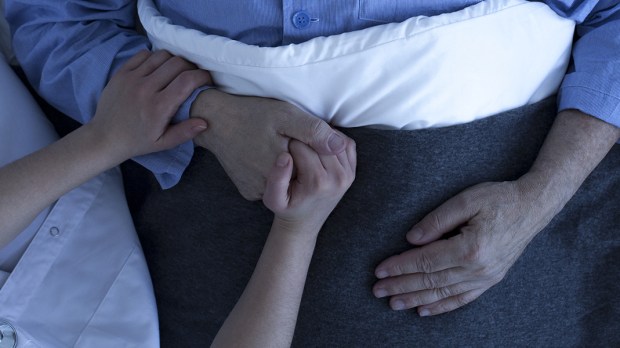It didn’t get much attention, but in June the USCCB approved “Guidelines for the Celebration of the Sacraments with Persons with Disabilities.” It merits some attention, particularly from priests, deacons and EMHCs who regularly minister to those who are sick or hospitalized.
You can read it all here.
One section, on the Eucharist:
21. The Eucharist is the most august sacrament, in which Christ the Lord himself is contained, offered, and received, and by which the Church constantly lives and grows. It is the summit and the source of all Christian worship and life, signifying and effecting the unity of the People of God, providing spiritual nourishment for the recipient, and achieving the building up of the Body of Christ. The celebration of the Eucharist is the center of the entire Christian life. 22. Parents or guardians, together with pastors, are to see to it that children who have reached the use of reason are correctly prepared and are nourished by the Eucharist as early as possible. Pastors are to be vigilant lest any children come to the Holy Banquet who have not reached the use of reason or whom they judge are not sufficiently disposed. It is important to note, however, that the criterion for reception of Holy Communion is the same for persons with intellectual and developmental disabilities as for all persons, namely, that the person be able to “distinguish the body of Christ from ordinary food,” even if this recognition is evidenced through manner, gesture, or reverential silence rather than verbally. Pastors are encouraged to consult with parents, those who take the place of parents, diocesan personnel involved with disability issues, psychologists, religious educators, and other experts in making their judgment. If it is determined that a parishioner who is disabled is not ready to receive the sacrament, great care is to be taken in explaining the reasons for this decision. Cases of doubt should be resolved in favor of the right of the Catholic to receive the sacrament. The existence of a disability is not considered in and of itself as disqualifying a person from receiving Holy Communion. 23. Given the paramount significance of the Eucharist in the lives of the faithful, and in light of medical and technological advancements that affect Catholics with disabilities, new questions have arisen regarding the reception of Holy Communion, and circumstances that were once rare have even become relatively common. Clergy and extraordinary ministers of Holy Communion are encouraged to become familiar with the needs of their parishioners. In many instances, simple accommodations can be very helpful, and should be embraced by all at the parish level. 24. Catholics who require nourishment through feeding tubes are encouraged to receive Holy Communion, as are all the Catholic faithful. Christ is sacramentally present under each of the species, and Holy Communion can be received under the species of bread or wine alone. Since the full presence of Christ and his sanctifying grace are found in even the smallest piece of the consecrated host or in a mere drop of the consecrated wine, the norm of receiving through the mouth remains the same for those who otherwise use a feeding tube for sustenance, and Holy Communion is not to be administered through a feeding tube. For these communicants it will commonly be possible to place one or a few drops of the Precious Blood on the tongue. Clergy and pastoral ministers are encouraged to use these guidelines and consult with physicians, family members, and other experts on a case-by-case basis, to determine how those who use feeding tubes may avail themselves of the abundant fruits of Holy Communion. Specialized instruction for extraordinary ministers of Holy Communion is to be provided as required. 25. Catholics with Celiac Sprue Disease or other conditions that make them gluten intolerant should be given the opportunity to receive a small fragment of a regular host, and made aware of the options to receive a low-gluten host or to receive under the form of wine alone. In the event of intolerance to gluten and wine, mustum may also be an option, with the approval of the local ordinary… 26. When baptized Catholics who have been regular communicants develop advanced Alzheimer’s or other age-related dementias, there is to be a presumption in favor of the individual’s ability to distinguish between Holy Communion and regular food. Holy Communion should continue to be offered as long as possible, and ministers are called to carry out their ministry with a special patience. If swallowing becomes particularly difficult, decisions regarding the continued reception of Holy Communion may have to be faced. This pastoral decision is to be made on a case-by-case basis, in consultation with the individual, those closest to him or her, physicians, and the pastor.
Check out the entire document.

